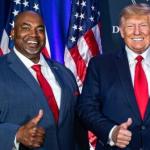Amanda Marcotte’s Salon interview with religion scholar Matthew D. Taylor is pretty good: “Trump’s revolution succeeds: ‘One of the fastest shifts in evangelical thought in American history’.”
 The focus here is on the New Apostolic Reformation, a collection of entrepreneurial, non-denominational, mass-media “prophets” and “apostles” whose brand of Pentecostal/charismatic Christianity promotes — and is shaped by — right-wing, nationalist, authoritarian politics.
The focus here is on the New Apostolic Reformation, a collection of entrepreneurial, non-denominational, mass-media “prophets” and “apostles” whose brand of Pentecostal/charismatic Christianity promotes — and is shaped by — right-wing, nationalist, authoritarian politics.
Most of these apostles and prophets, to be blunt, are full-gonzo bonkers. They’re cuckoo for Coca Puffs. They believe that God speaks to them but the things they report that God tells them make it sound like a caller on Coast to Coast AM. They believe in witches and witchcraft and witch-warding and witch-hunting. They espouse an understanding of “spiritual warfare” that is essentially indistinct from polytheism. They oppose the claims of every New Age huckster, woo-woo spiritualist, or psychic in a way that assumes that every such claim is literally true and valid. And they’re all, at most, one degree of separation from the most transparent grifters in the “prosperity gospel” and “faith healing” rackets.
That this clown car of absurdities is, in fact, the most popular and influential force in American evangelicalism is embarrassing, but it also makes it difficult to discuss. Many of us still instinctinvely think of people like Kenneth Copeland or Benny Hinn as the “weird fringe” of white evangelicalism, compared to the venerable, institutional evangelicalism of, say, Christianity Today or Wheaton College or InterVarsity and the National Association of Evangelicals. But the NAR is bigger than the NAE. It’s also louder, wealthier, more influential, and more involved in shaping what is, today, normal for the median American evangelical. So words like “weird” and “fringe” can be misleading.
In this interview, Taylor argues that this topsy-turvy centralizing of the whacky fringe theologies and ideologies of the NAR is a recent phenomenon, a consequence of MAGA politics merging their Christian supremacy with Trump’s white supremacy. Here’s Taylor:
They embrace Christian supremacy, this idea that Christians are supposed to be in charge of society and are mandated by God to take over societies and transform them into conservative Christian utopias. We might use the term theocracy, although it’s a little more complicated than that. But they want Christians at the top of every part of society. They want to create a new vanguard of Christian leadership that will take over every nation in the world. And they’ve especially targeted the United States right now.
This is not entirely historically unprecedented. In the past, we’ve seen the crusades and pogroms and imperialism and colonialism and racism in Christian history. But in the modern world, NAR theology is very much a departure from the mainstream, even mainstream evangelical theology. It’s troubling to see a movement that 10 to 15 years ago would have been seen as quite extreme now being mainstreamed in Republican politics. It’s also moving into the center of American evangelicalism and the assumed leadership of the religious right in America.
Some of it was a historical accident. Since 2002, Trump has been close to this megachurch pastor from Florida named Paula White Kane. When Trump entered the presidential race in the summer of 2015, he asked Paul White Kane to be his liaison to evangelicals. The problem is that Paula White Kane herself is not a conventional evangelical. She’s a female preacher. She’s charismatic. She’s a prosperity gospel preacher. She’s a televangelist and doesn’t know a lot of the mainstream evangelical leaders. So she starts reaching out to the people that she does know. A number of them are NAR leaders.
It parallels the way that Trump revolutionized the Republican Party. Trump came as an outsider and brought with him this whole wave of fringe characters. People like Steve Bannon and Roger Stone, people who were very much on the margins of the Republican Party. And Trump brought those people into the center of Republican politics. Traditional Republicans are disdained and scorned by the vast majority of self-identified Republicans. A similar revolution has occurred within American evangelicalism. Figures willing to embrace Trump — willing to support and propagandize him — he elevated them and their ideas and moved them into the middle of the conversation in American evangelicalism.
It’s one of the fastest shifts in evangelical thought in American history. Ideas that would have been mocked in mainstream Republican circles even 15 years ago are now getting more than 50% approval among American evangelicals. We are living through a tectonic shift in both the culture and theology. It’s reflected in the extremism we see every day in evangelical and Republican politics.
The shift Taylor describes is, I think, real. But I think it pre-dates Trump’s takeover of the Republican Party. I think it occurred at some point in between 2007 and 2011. Why those dates? Just ask the senior senator from Iowa, Chuck Grassley. The following is from Wikipedia’s summary of his “United States Senate inquiry into the tax-exempt status of religious organizations“:
On November 5, 2007, United States Senator Chuck Grassley announced an investigation into the tax-exempt status of six ministries under the leadership of Benny Hinn, Paula White, Eddie L. Long, Joyce Meyer, Creflo Dollar, and Kenneth Copeland by the United States Senate Committee on Finance. In letters to each ministry, Grassley asked for the ministries to divulge specific financial information to the committee to determine whether or not funds collected by each organization were inappropriately utilized by ministry heads.
This was, for Grassley, both a taxpayer-protection and consumer-protection effort. There had been some anecdotal evidence that some of these “ministries” might perhaps occasionally be diverting donors’ tithes and offerings to purposes other than ministry.
And by “some anecdotal evidence,” I mean of course that it was thuddingly obvious to the entire world that these six ministries were shameless cons run by shameless con artists fleecing the faithful to buy the private jets they used to fly themselves between their multiple luxury homes.
But Grassley’s investigation of these scammy televangelists was also an attempt to support his white evangelical supporters. Grassley was a conservative Republican who had long enjoyed the support of mainstream, respectable, institutional white evangelicalism. Mainstream, respectable, institutional white evangelicalism was horrified and embarrassed by cable TV hucksters and Gantries like Copeland, White, Hinn, and Co. They didn’t want channel-surfing Americans to stumble across some faith-healing grifter and think that such a disreputable figure represented them. Nor did they appreciate that these hucksters were not just raking in the big bucks, but were also stealing sheep from their flock, with these NAR-type mega-churches poaching from their congregations.
So when Sen. Grassley launched his investigation in 2007 he expected it to help him with evangelical voters. And it did! But only with those evangelical voters who were part of that old mainstream. The investigation proved to be extremely unpopular with those evangelicals from the same “fringe” as Hinn, White, Copeland, et. al.
In terms of the print media still popular back in those days, Grassley’s investigation won him respect from Christianity Today and animosity from Charisma magazine. Over the next four years Grassley came to appreciate that the latter was a lot more important than the former. The Charisma “fringe” was way bigger than the Christianity Today “mainstream.”
And it was way more politically influential and politically connected. This was underscored, for Grassley with his investigation launching just before his party got swept up in Sarah Palin fever — a proto-MAGA version of white Christian supremacy that was explicitly the product of NAR-style charismatic Christianity.
So Grassley’s probe ended with a whimper, closing shop in 2011 with no definitive findings or penalties — giving these corrupt grifters the chance to take a victory lap and claim they’d been “vindicated.”
I wouldn’t say Matthew D. Taylor is wrong to call the 21st-century transformation of white evangelicalism “Trump’s revolution” because Trump personifies it. But he is its apotheosis, not its cause.*
Back in 2011 Chuck Grassley already realized that his party belonged to the evangelicals, and that evangelicalism belonged to people like Benny Hinn, Kenneth Copeland, Eddie Long, and Paula White.
* Homer Simpson Voice: “It’s apotheosis … so far.“

















